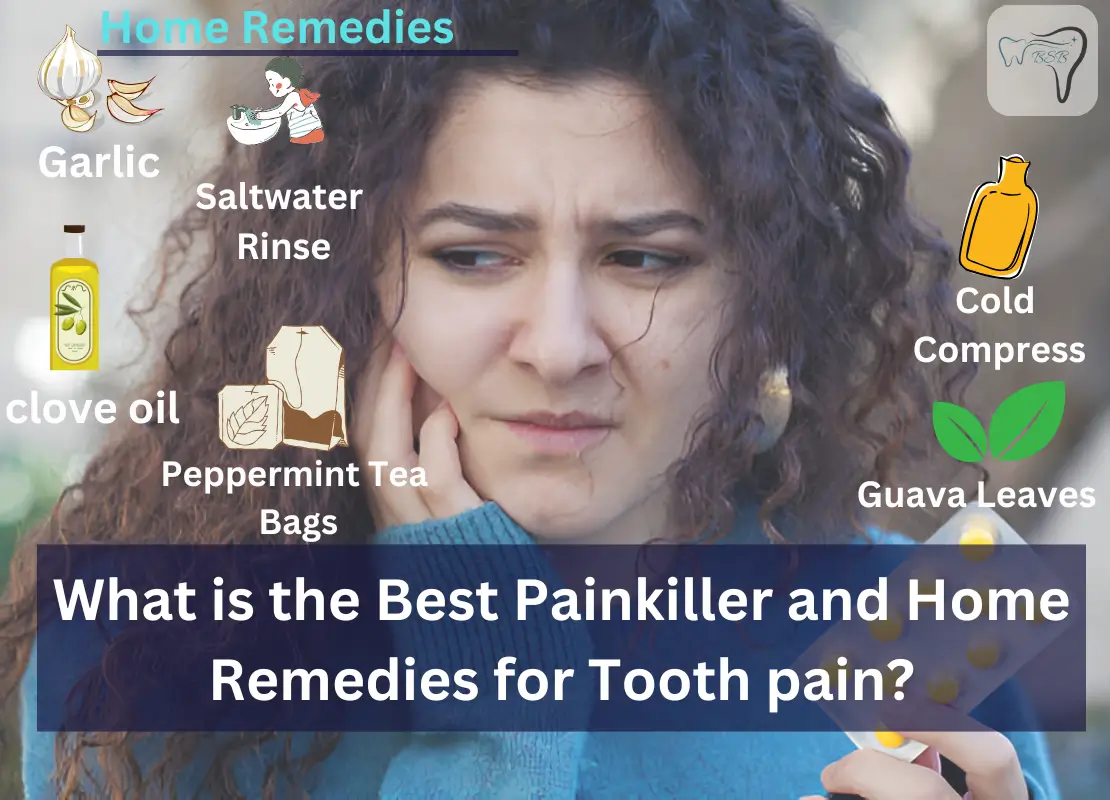That nagging toothache starts as a mild annoyance but quickly turns into excruciating pain, with sharp lightning-like shooting pain and throbbing like a marching band in your right incisor or left molar. The sensitivity and soreness make eating anything from crunchy foods to peanut brittle impossible (leaving you with blended spaghetti), while the all-consuming ache on one side of your mouth disrupts sleep.
Before grabbing pliers in horror, try dentist-approved home remedies and tried-and-true remedies backed by science for instant relief and discomfort management at inconvenient times. If your tooth hurts persistently, skip the painkillers and schedule a dental appointment or visit an emergency dentist – you might need active treatment, root canal treatment, or tooth extraction.
What is the Best Painkiller and Home Remedies for Tooth pain?
What is Tooth Pain?
As a practicing dentist, I’ve seen how tooth pain disrupts daily lives as a distressing experience. Various origins – from dental cavities linked to poor oral hygiene, to cracked teeth, damaged teeth, sensitive roots, and infections – cause this discomfort. Through scientific studies and precise diagnosis, we dentists determine the best pain management strategy.
Whether it’s a filling, repair, or treating gum issues, our targeted approach to treatments and specialized care addresses the underlying mechanisms and complications, focusing on both effective relief and prevention to ensure a pain-free smile.
Dentist-Approved Home Remedies for Toothaches and Pain
Salt Water Rinse – A Natural Remedy for Tooth Sensitivity
When toothaches strike and pain becomes unbearable, a simple yet natural remedy awaits in your kitchen: saltwater. Mix 1/2 teaspoon to 1 teaspoon of salt in a glass of warm water, swish it around your mouth for 30 seconds, and spit – repeat up to five times a day for temporary relief.
This age-old solution not only helps loosen trapped popcorn skin between your teeth and gums (when floss isn’t handy), but also acts as a powerful disinfectant to kill bad bacteria causing infection and inflammation.For sensitive areas with damage, this gentle rinse can alleviate discomfort until you can visit your dentist, helping keep your mouth clean and comfortable through multiple rinses as the solution dissolves away your pain.
Ice Pack – The Natural Pain Reliever
After a painful bite on a gobstopper causing trauma to your teeth, use an improvised cold compress – wrap an ice pack, loose ice, or frozen peas in a towel or blanket and apply to the affected area for 15-20 minutes throughout the day (every 2-3 hours). This makes blood vessels constrict, numbing the spot to reduce excessive pain, swelling, and inflammation.
Don’t expose bare skin for prolonged periods to avoid injury, and while this safe, transitory solution helps with minor discomfort, any visible chips or hidden cracks need more than an untrained eye – die from pulling an infected tooth can be a harsh reminder to seek professional help before the situation worsens.
Natural Relief with Peppermint Tea
As a long-time sufferer of dental sensitivity, I’ve discovered that peppermint oil offers remarkable pain relief for toothache. A groundbreaking 2015 study revealed that these powerful oils possess anti-microbial properties, providing significant benefit to oral health and dental health. The simple yet effective treatment involves applying tea bags soaked in a warm cup of peppermint tea directly against aching teeth.
For enhanced results, your dentist might recommend this gentle remedy – place the bag in a freezer for a cold compress effect before application. This dual-action approach has consistently proven its worth in my personal experience managing tooth discomfort.
Over-the-Counter Solutions for Tooth Pain
When that persistent throb of tooth pain strikes, your first common reflex might be reaching into your medicine cabinet for OTC painkillers. From my years of practice as a dentist, I’ve found that over-the-counter pain killers vary in their effectiveness. A recent study confirms what I’ve observed: Advil (ibuprofen) typically offers more efficient fast relief compared to Tylenol (acetaminophen) or aspirin for intense dental discomfort.
When visiting your local pharmacy, you’ll find these medications in any bottle, but remember to follow dosage guidelines to ensure safe use of these remedies. While these options provide immediate pain relief for toothache pain, I always advise my patients that prolonged use should trigger an evaluation – it’s essential to understand when temporary relief isn’t enough.
Clove Oil – The Natural Pain Reliever
Throughout my years in dental practice, I’ve found that clove oil, a time-tested natural remedy used for centuries, remains one of the most effective ways to alleviate dental discomfort. The magic lies in eugenol, a powerful natural anesthetic that works to numb and reduce pain in the affected area.
From my experience, the most effective application method involves taking a cotton ball, letting it soak in a mixture of a few drops of clove oil and a gentle carrier oil like coconut oil, then gently pressing it against your aching tooth.This simple yet potent solution has helped countless of my patients manage their toothache and ear pain until they could get proper treatment.
Warm Compress – The Soothing Relief for Tooth Pain
When dealing with persistent toothache pain, especially when accompanied by muscle tension and jaw problems, I’ve often recommended a simple yet effective solution to my patients. A warm compress works wonders in relaxing the facial muscles while reducing inflammation in the affected area. The technique is straightforward: soak a clean towel in warm water and apply it to your cheek where it hurts.
For optimal results, I advise my patients to hold it there for 15-20 minutes, repeating the process every 2-3 hours as needed to alleviate the discomfort. From my experience treating dental pain, this method proves particularly effective for those night-time aches when immediate professional care isn’t available.
Comprehensive Guide to Pain Relief Medications
As a dental expert specializing in pain relief, I’ve guided countless patients through various treatment options. For mild pain to moderate pain, OTC painkillers like ibuprofen (200-400mg every 4-6 hours), which offers anti-inflammatory benefits, often proves effective for toothaches.
Acetaminophen (500-1000mg), known for its fever-reducing properties, and aspirin (325-650mg) with its cardiovascular benefits, are also reliable for tooth discomfort, though watch for stomach upset and liver complications when reaching the daily limit. Following proper dosage guidelines is crucial to avoid side effects. For those with pre-existing conditions, consulting a healthcare professional about these medications is essential.
In cases of severe tooth pain, prescription painkillers like opioids (oxycodone, hydrocodone) or non-opioid options such as tramadol can provide potent relief, though dependence risks must be considered. Through careful selection and monitoring, we can achieve effective relief while managing inflammation safely.
Effective Natural and Home Remedies for Relieving Tooth Pain
Saltwater Magic:A warm saltwater rinse isn’t just for oral hygiene – it’s your first line of defense. Gargle this simple solution to reduce inflammation and experience immediate soothing relief.
The Power of Cloves:Nothing beats the potent analgesic properties of clove oil when it comes to tooth pain. Apply directly to the affected area for temporary but powerful relief.
Cool Comfort:Applying a cold compress to your cheek helps numb the nerves and alleviate swelling. It’s a natural way to combat discomfort that’s always readily available.
Peppermint Solution:A cooled peppermint tea bag offers surprising numbing properties when placed against the affected tooth. This remedy delivers gentle but effective pain relief while you wait for professional care.
Benefits and Limitations of Tooth Pain Treatments
Benefits:As a dental care enthusiast, I’ve discovered that natural remedies provide excellent relief without the side effects associated with medications. These accessible, cost-effective solutions can be easily tried at home. Simple treatments like saltwater rinses promote oral health, offering potential benefits that I’ve seen work wonders for immediate pain management and can cure gum infection by eliminating bacteria causing inflammation.
Limitations:From my dental expertise, natural remedies offer temporary relief for mild to moderate pain, but severe toothaches need medical intervention. The effectiveness of these natural approaches vary between individuals, requiring patience and consistency. These methods best complement conventional approaches in your daily oral care routine.
Oral Hygiene Practices to Reduce the Risk of Tooth Sensitivity
Brushing and Flossing:The key to avoiding tooth pain lies in solid oral health practices. Regular brushing and flossing not only remove plaque but also prevent cavities. Turn it into a habit: brush twice a day, floss once daily for truly comprehensive care.
Gentle Brushing Matters:Choose a soft-bristled toothbrush and stick to gentle, circular motions to avoid enamel erosion. I’ve seen countless cases where brushing hard triggers tooth sensitivity and pain.
Power of Mouthwash:An antimicrobial mouthwash in your daily routine helps reduce bacteria, enhances gum health, and is excellent at preventing issues that cause tooth pain.
Conclusion
For tooth pain relief, saltwater rinses and ice packs are effective home remedies that can reduce discomfort temporarily. However, persistent or severe pain may indicate a more serious issue requiring professional dental treatment. It’s essential to consult a dentist if pain persists or worsens.
Ferquently Asked Questions(FAQ’s)
What is the fastest pain reliever for toothache?
For quick relief, ibuprofen, aspirin, or acetaminophen can help, with studies showing ibuprofen as the most effective. Taking the recommended dosage of these over-the-counter medications reduces inflammation and toothache pain fast.
What is the fastest home remedy for tooth pain?
A cold compress can numb tooth pain and reduce swelling quickly. Clove oil has natural analgesic properties, while a salt-water rinse helps kill bacteria and ease inflammation. Other fast remedies include a tea bag compress, hydrogen peroxide rinse, and thyme essential oil for pain relief.
Which painkiller is good for tooth pain?
Acetaminophen (500-1000 mg every 4-6 hours) helps relieve tooth pain, but exceeding the daily limit can harm the liver. Aspirin (325-650 mg every 4 hours) is also effective but should be taken with food to prevent stomach irritation.

